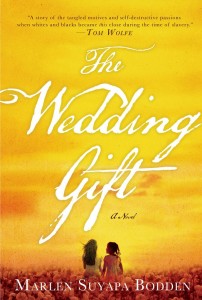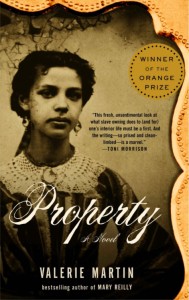Slavery Novels: The Residue of History
by Kristen Hannum
Toward the end of Margaret Mitchell’s 1936 classic Gone with the Wind, Ashley Wilkes shares with Scarlett how much he misses the antebellum days. “There was a glamour to it, a perfection and a completeness and a symmetry to it…,” he sighs.
Oh my.
At least since Alex Haley’s Roots (1977) and Toni Morrison’s Beloved (1987), far fewer sympathetic characters hold similar views in historical novels, especially literary, but also popular. While a system of indentures had existed in the colonies and fledgling United States, the slave trade that developed was completely different from indentured servitude, a system based on contracts that were almost always entered into freely and came with a finite, defined term of service — usually five years. Roots, Beloved, and more current novels allow readers a glimpse into the human lives caught up in the brutal Atlantic slave trade that evolved to encompass the permanent enslavement of an entire race: not only the kidnapped African, but also his or her children, in perpetuity.
The list of recent novels dealing more realistically with U.S. slavery is long and impressive. For starters, consider: The Astonishing Life of Octavian Nothing by M.T. Anderson (Candlewick Press, 2006), The Wedding Gift by Marlen Suyapa Bodden (St Martin’s Press, 2013), The Kitchen House by Kathleen Grissom (Touchstone, 2010), Someone Knows My Name by Lawrence Hill (W.W. Norton, 2007), Kind One by Laird Hunt (Coffeehouse, 2012), The Known World by Edward Jones (HarperCollins, 2003), Property by Valerie Martin (Doubleday, 2003), The Good Lord Bird by James McBride (Riverhead, 2013), Wench by Dolen Perkins-Valdez (Amistad, 2010), and Freeman by Leonard Pitts Jr. (Bolden, 2012).
Bodden, author of The Wedding Gift, believes that although it may seem like there have recently been many novels (and also films) concerning slavery, it’s only because there were so few of these types of works earlier, illustrating that both writers and readers were avoiding a crucial issue in American history.
Professor Tim Ryan of Northern Illinois University thinks Barack Obama’s election has renewed the dialogue. He surveyed fiction about slavery in his book Calls and Responses: The American Slavery Novel Since Gone with the Wind (Louisiana State University Press, 2008). “Novels about slavery continue to perform valuable cultural work, as they always have,” he says.
Such novels reflect and further thinking about slavery and racism. They are important.
But for people to read them, Bodden points out, they also have to be good stories: “I first want them to put the book down and say that was a good story,” she says. “If they don’t say that, then I failed as a novelist.”
Set in 1852 Alabama, Bodden’s debut novel, The Wedding Gift, is the story of the Allen family, and in particular of quick-witted and gutsy Sarah Campbell, the unacknowledged and enslaved daughter of plantation owner Cornelius Allen by his housekeeper. When Cornelius’s white daughter Clarissa marries, Cornelius gives Sarah to Clarissa as a wedding gift. The story’s ending turns readers’ expectations upside-down.
Bodden tells the story through Sarah’s point of view, and also through that of Allen’s wife, a woman trapped within a life-sapping hierarchy in which she, too, is a victim.
The Wedding Gift boasts an unusual background. Bodden, a lawyer with the New York Aid Society, thought she’d write fiction when she retired. In her nonfiction reading, she discovered an 1841 court case from Talladega, Alabama, in which a plantation owner claimed his wife’s child was not his. The court found for the husband, awarding him all the property that his wife had brought to the marriage, including a young slave woman. “I’d love to write this as a historical novel,” Bodden thought. But she didn’t. She only became serious about writing the story four years later, in 2003, after a homeless shelter called her about a young Asian woman trying to get her wages paid. The woman’s employers had confiscated her passport and forced her to work without pay. Bodden realized she was facing a modern-day victim of slavery. Now she had to write her novel. “I wanted to do it for my ancestors, beginning in the sixteenth century and brought to the New World as slaves,” she says. “I needed to give them a voice — and that would also give the slaves of today a voice.”
Agents and editors told Bodden that people didn’t want to read about slavery. She self-published and doggedly promoted her book, with small-scale success. She signed with Amazon to promote the book, selling another 140,000 copies, mostly ebooks. An agent became interested and in 2012, Bodden signed four separate six-figure deals with publishers in the United States and Europe.
She’s now writing her second novel — but don’t expect it out anytime soon. “I’m still practicing law full time,” she says. “I’m a slow, deliberative writer and I do lots of research. I want my history to be authentic.”
Property, by Valerie Martin, is often cited as a new classic in novels looking at life in the antebellum South, a counterpoint to Gone with the Wind. Set in 1828 Louisiana, it examines the lives of Sarah, an enslaved woman, and Manon Gaudet, a free woman. The beautiful, self-centered wife of a sugar plantation owner, Manon is the book’s first-person protagonist, an unreliable narrator if ever there were one. Intensely aware of the injustice she faces as a woman, her racism means she cannot see beyond herself to understand that Sarah, who has been repeatedly raped and borne two of Manon’s husband’s children, is a victim of even greater injustice. The reader’s initial impulse to sympathize with Manon is masterfully chipped away, and yet our desire to find out what happens — to Manon and especially to Sarah — drives us on.
The past, Martin believes, is a place we can’t go and therefore we can’t know. “And yet, how invested people are in the past!” Martin says.
So how does an author research a place she can’t go? One technique Martin used was to read the popular novels of the era. “Those are the fantasies or moral knowledge that people had,” she says. She also read personal letters. “The letters of the period often expressed annoyance at having to own slaves because the owners had to take care of them,” she says. “I thought about what living in those times would do to a person who feels put upon because of owning another person.”
Martin has written that her novel, which won the Orange Prize in 2003, was a meditation on “the fantastic and constant perversity of the oppressor to feel victimized by the oppressed.”
The past that Margaret Mitchell traveled to — a genteel plantation world destroyed by war and a leading lady largely immune from the sexist laws of her era — was very different than the brutal, sexist antebellum world that Martin wrote about in Property. There’s a similar distance between William Faulkner’s Absalom! Absalom! (also published in 1936), about destructive, nebulous cultural myths and racism, but centered on white males, and Laird Hunt’s Kind One, also a story that unfolds like an onion to reveal different layers of meaning — but Hunt’s novel is about women, both African-American and white.
When it comes to writing about slavery, “gender has become central,” says Ryan.
Martin sees the new focus as being due, at least in part, to who’s writing. “African-American women are writing about slavery and repopulating the imaginative landscape with more credible characters,” she says.
“The question of gender is very important to me,” says Bodden. “Of course it was better to be a free white woman, but I learned while researching the book that slave owners weren’t able to shut violence off when it came to their families. They controlled the slaves with violence, and that spilled over into their family relationships. They controlled by threatening to divorce (which would leave their wives penniless), through sex, and through physical violence.”
Paralleling America’s political divisions, publishing houses and individuals are still releasing novels that look back nostalgically at the white-pillared Confederacy, and at Southern society during the Civil War. Some focus on honor and bravery in battle. Slavery is an insignificant part of these stories. Military novelists such as Jeff Shaara, John Jakes, and Newt Gingrich satisfy readers who see southern history in this light. Another shoot from the lost cause branch are romances about dashing and beautiful white Southerners falling in love with one another and, incidentally, served by well-treated slaves. These books embody Wilkes’s wistfulness for the “glamour …of the old life I loved.”
Ryan thinks more pitfalls lurk for white novelists than for African-Americans who write novels about slavery due to the fact that, for centuries, whites controlled the cultural conversation about slavery. “When a white person sits down to write, that writer is attaching herself to that tradition whether she wants to or not,” he says.
Some white authors have successfully negotiated the dialogue. “For instance, you don’t read Property and say there are problems,” Ryan acknowledges. “She tells the story from the white slave owner’s view. Artistically it works.”
It’s been suggested to Martin that she write a sequel to Property told through Sarah’s point of view, allowing readers to follow her after her escape. “I wouldn’t touch that with a ten-foot pole,” Martin says.
She shares, however, that one interviewer labeled her novel — and all novels about slavery, no matter who the author—as racist, written to titillate since they focused on white men abusing black women or men. While that’s true for some — Mandingo, by Kyle Onstott (1957), comes to mind — it seems far off-base with regard to thoughtful novels exploring slavery’s effect on both whites and African-Americans.
Lawrence Hill, a Canadian author of African-American descent on his father’s side, has a different kind of cautionary tale. His historical novel, Someone Knows My Name, was titled The Book of Negroes when it was published in Canada. American editors said that wouldn’t fly in the United States, catching Hill unawares. The word “negro” has different connotations in Canada, he has said. That original title was taken from a historical document listing escaped slaves who sailed under British protection from the U.S. colonies to Nova Scotia.
Whatever the background of the writer, Ryan argues, the goal is to write about slavery — and other ethical questions — in a way that is morally engaged but without being heavy handed. “One of the things I’m most focused on is moral complexity, looking beyond easy answers,” he says. “I always hope that a book will make me think in ways I never have, rather than reading a book where things I already believe are validated.”
Today’s books on U.S. slavery often do just that.
About the contributor: KRISTEN HANNUM, a working journalist and editor, is currently working on a nonfiction book about the American South with novelist Lee Patton.
______________________________________________
Published in Historical Novels Review | Issue 66, November 2013








